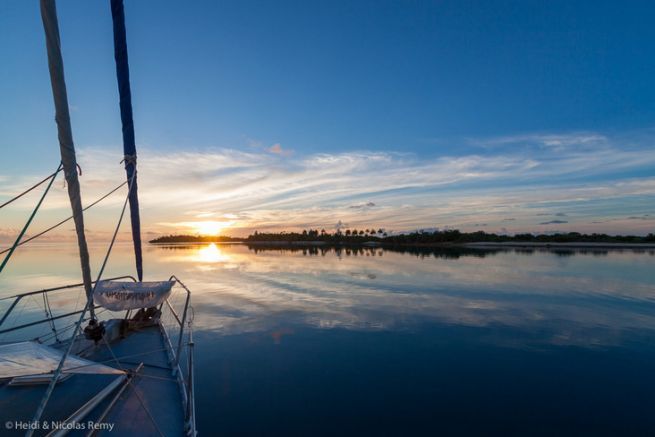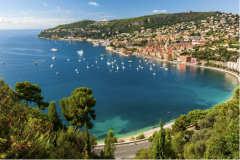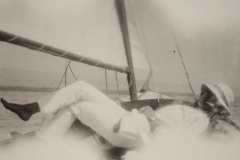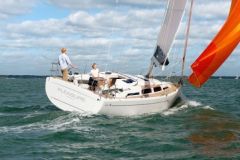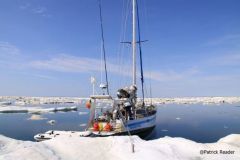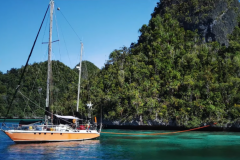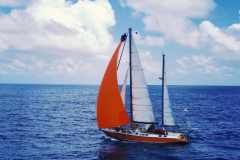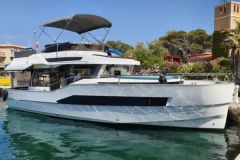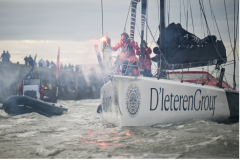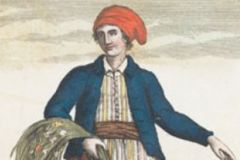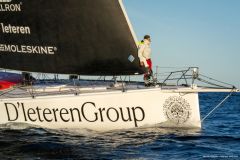" Teenager ", Nicolas tells us, " i dreamed of going around the world. My childhood was filled with stories, from Stevenson to Jules Verne. I was fortunate enough to meet Heidi, a lover of travel, who agreed to join my dreams and desires, the better she joined. "Nicolas expresses their differences, which are beneficial to their project. " Heidi had no sailing experience. In retrospect, I think it's a good thing. We each gained skills on the same subjects (mechanics, navigation, first aid, weather) with the aim that each could replace the other at any time and, as a result, both of us would enjoy the same level of the voyage. "
Getting started remains the most complicated part of the adventure
The most complicated part of this 7-year adventure was to get started and not go back on what was decided. Not to let oneself be influenced, too, neither by the worried entourage nor by passive envious people. " We can classify the difficulties into 2 main categories", the traveller explains: "Contingencies, living on a boat, leaving with enough stock, but not too much, managing insecurity, preparing for storms or extreme bad weather. These are pragmatic and factual elements that can be managed by getting organised. "
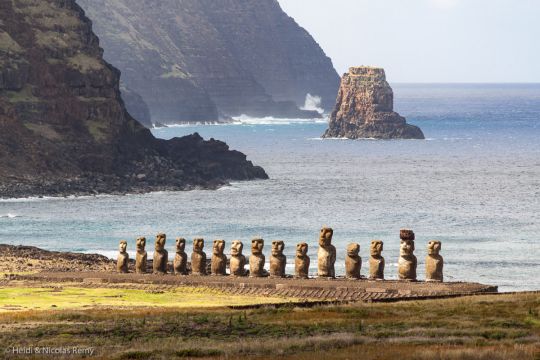
Beyond these easily manageable difficulties remains the human factor, the other one, the one that we are going to abandon represents a difficulty, as Nicolas explains to us. " You have to do things that involve deep down. Resigning from one's job is the first strong act one takes. The second is to ask yourself what you're going to do after the trip. Even if 7 years is a long time, it goes by quickly, very quickly, so you have to plan for what you'll do afterwards or at least think about it. Relatives are worried, which is understandable and reassuring, because it shows that they care about us. "
Especially don't run away
Relatives generally think that leaving for such an adventure is motivated by a desire to leave one's daily life behind. " If you set off on such an adventure with the sole idea of fleeing, the trip is doomed to failure. Instead of fleeing, we were driven by a desire for discovery. We wanted to see the other, whether it was a country, a landscape, a human being or an anchorage. This other is exciting and captivating. "
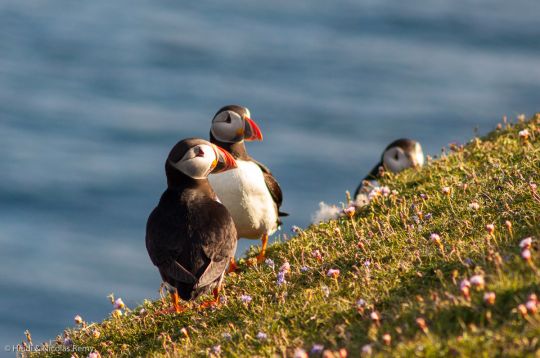
Bi-weekly reproach session
About this permanent cohabitation, how did the couple deal with the inevitable stress and tensions that promiscuity can generate? " Fighting is part of life and therefore part of the journey. A friend had advised us to organize reproach sessions, every fortnight, on the principle of a good fight every 2 weeks. In fact, it doesn't work, because we don't have anything to reproach ourselves with at that time. "
The confined space of a boat, conducive to argument? " When we acquired the boat, everything seemed perfect. I pointed out to my wife that under no circumstances would we be more than 10 metres away from each other. Including when we're making faces at each other." explains Nicolas, before adding : "She said no, it was about 50 feet, actually.. [Editor's note: Mast height] . And I'm not the one going up! "
How to manage the return?
After the adventures, it is reasonable to return one day. Heidi and Nicolas had planned this return from the first day and knew it would take place. So a countdown started at the start. " In the last year of the adventure, we spent it moving up to more European latitudes. It was a landing period, a kind of slow and gradual return to the weather, habits and schedules we knew. It allowed us to come back smoothly, smoothly and without tears. "The return is also that of the contingencies of earthlings, looking for and finding work, with the difficulties that this entails. This is what Nicolas explains: " Heidi was a lot quicker than me to get a job. As a result, I was home alone during the day. It was one of the difficulties too, spending a lot less time together. We had been together for 7 years 24 hours a day and the work separated us overnight. "
Even the homecoming is exciting
The shock of return does exist, but it is short-lived. It's with time that you become aware of what you've been through, as the navigator explains: " Today, we have gained the satisfaction of having realized a dream and of having benefited from the exceptional opportunity that life gives us to realize it. Everyone has dreams in mind and we are aware that few people have the means to make them come true. We are grateful to life for allowing us to do so." With emotions too. "The reunion is moving and joyful. We were clearly aware of our good fortune, and finally, after all this time, coming home is pleasant. Home Sweet Home. "
Keep dreaming?
Can we nevertheless continue to have dreams and pursue them when we have achieved the greatest of all, which is freedom? No doubt, according to Nicolas: " We recreate projects of different sizes, but no less important. Finding work first. After 7 years with other types of constraints, it's not neutral. And to do, also the books, which a friend of ours gave us the idea for [Editor's note: Hedi and Nicolas have already published two books: around the world in 80 islands and around the world in 80 ports ] ." And getting back into the ordinary after this extraordinary, as Nicolas explains: " I'm having a very exciting experience in a junior company right now, especially in the current period. It's extremely motivating to participate in a new construction, but the essence of which remains close to this world tour. "
What about on the water?
One can imagine that after 7 years at sea, one on top of the other, the couple would find it difficult to set foot on a boat again. What's really going on? " We do not have a short-term project. After 60,000 miles on the water, "Fleur de Sel" needs a refit. "No plans, perhaps, but some very specific ideas nevertheless, according to the captain's explanations: " We'd like to go back to Northern Europe, sail the Baltic. And also explore Denmark, Sweden, Finland, Poland, Estonia... We want different adventures, maybe less far from the motherland. But we will probably leave again, for shorter sailing trips in the summer. "
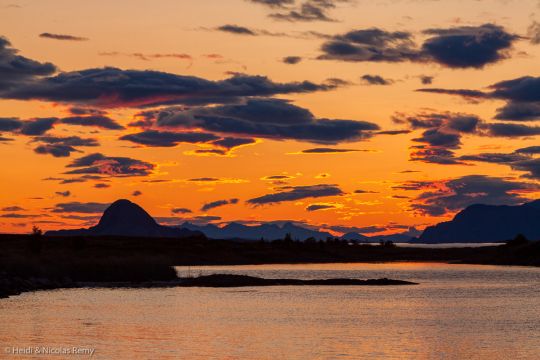
You can feel that if he has physically come back - and really come back for that matter - Nicolas has changed, he has left little pieces of his old self offshore. " I came back, yes, but different, grown up and aware of my good fortune. I know my roots all the better because I've been away from them for a long time. I became a citizen of the world. It's a sensitive experience to qualify, almost mystical. I knew from the beginning that there would be an end and a return, so there was no pain or tearing. I temper the notion of return, because I don't know what it means to return. I just stopped being a nomad and settled down again. But this return home has allowed me to accompany some of my loved ones in their last days, that's the positive thing that I remember. I was very much afraid that this would happen to me during the journey, I don't know how I would have experienced it then. "
Philosopher, about his adventure, Nicolas continues: " We didn't quench our thirst, but we drank a lot and it's nice. "Adventure has also shaped the navigator to life ashore. " I've learned to live from day to day. I am content with more simplicity and simple happiness. I no longer suffer for the same things. "
The current period of limitations on our freedoms is certainly complicated to live through for this freedom-lover? " The confinement, we lived it for 7 years during the crossings. I would almost say that we got used to it. Then the first confinement [Editor's note: March 2020] has allowed me to complete our second book [ Around the world in 80 ports ] . It won't have been useless time for us. Especially since these books worked much better than we could have imagined at first! "
Maintaining contact with meetings
During such an adventure, encounters are numerous. However, one must keep in touch with those one has met. Nicolas explains the reasons for this distension of contacts. " Most of them are locals. While some are geographically close, others are on the other side of the world. Despite modern means of contact, we are far away. And as the saying goes, "out of sight out of mind". When we no longer share the path of the other, we live only on memories. The rubber band stretches a little. But it is not dramatic, destiny is such that, inevitably, we will cross their paths again in this life. "The quality of the contacts is a complete enrichment during such a journey. " We were lucky enough to meet people so different, in their cultures, in their professions or in their daily lives, it's unimaginable. From the truck driver who went to work two nights a week to deliver the mail on the other side of Australia to the villager in the depths of South America. All the glances we met were gifts. "
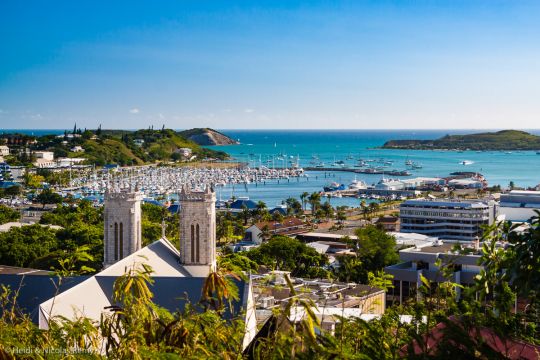
Any advice for seafarers on the move?
Looking back, how would Nicolas advise those who today would like to do what he did? " I don't want to teach a lesson. Everyone will build and endure his journey. One should not try to make the same journey as another, but build one's own experience. Live your adventure and your journey, fully and according to your desire. Be yourself, make your journey in your own image. Be free and autonomous, always ready to change your mind or option, it is to guarantee your freedom without hindrance. When you are ashore, live like a local, respecting the way the locals live and accepting the way they live. It is not about imitation, but about respecting the way of life of those you visit. "
Time, infinite wealth
You will have understood that if Heidi and Nicolas have given themselves one luxury, it is the disposition of time. Nicolas quotes us an anecdote. " In Buenos Aires, we met a guy who gave us a hand fixing an epoxy part. He told us, "Save your time in the deep south. Be patient, don't go out in bad weather". It wasn't the advice of an old sea wolf, it was just implacable logic. Take your time and don't do it if you don't feel it. You still have time, that was the deep meaning of that advice. We have had the luxury of time, absolute wealth." No compulsion at all? "That doesn't mean we don't feel constrained at all, but we've learned to project ourselves into the long term. We couldn't say where we were going to be the next week, but we knew we would be on the other side of the Atlantic six months later. "
You have to conclude a discussion, like a trip. Nicolas gives us the quintessence of his journey, his philosophy of movement. " Travel in the first person, respecting other cultures and the planet. "
Heidi and Nicolas' logbook, to be found and devoured on :
